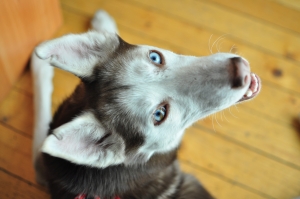 Dog Fear- Reader Question
Dog Fear- Reader Question
The following question comes from a reader of our site:
Why are some dogs just flat out scared of men? I have a 2 year old husky and he’s scared of men. I don’t believe there’s any history of abuse. He’ll run away or refuses to come to men and paces back and forth frustrated.
Rachel, Utah.
Thanks for this question, Rachel. Dog fear is one of the biggest things I deal with in my company simply because it’s at the root of so many behavior problems. Issues like dog aggression, some destruction, anxiety behaviors, and others all find their root in fear. In order to solve these issues it’s important to understand where these issues come from.
Dog Fear- What Causes It?
The reality is that there are only two places that dog fear comes from:
- Genetics
- Upbringing
It’s the old Nature Vs. Nurture argument that has been waging in the halls of academia forever. In fact, I find it unfortunate that many people these days are ignoring the science when it comes to dog behavior.
These days you don’t have to go far to find certain ‘breed apologists’. Just log on to your Facebook account and you’ll see your dog loving friends posting graphics about how awesome Pit Bulls are and how any aggressive Pit Bull is simply that way because the owner trained it to be that way.
This type of thinking completely ignores basic tenets of dog behavior.
Nearly everyone will agree that both nature and nurture compose the makeup behind temperament, personality, and character. Yet in the case of Pit Bulls, Rottweilers, German Shepherds, Dobermans, etc. people suspend this understanding in their attempts to protect their favorite breed.
Now, let me set the record straight first of all. I’m a big fan of Pit Bulls, Rottweilers (I own one), German Shepherds (I’ve owned a few) and Dobermans. And I’m not trying to tell you that ANY of these BREEDS are more prone to fear, aggression, or any other sort of behavior. But I will tell you that certain representatives of those breeds (and ALL breeds for that matter) can have larger propensities than others for fear, aggression, and other related behaviors.
I know I’m on my soapbox right now. You may be wondering why I’m off on a tangent about Pit Bulls and other powerful breeds when the question was about a Husky and fear. The reason is that people seem to be willing to accept that fear can cause bad behavior, and many of those same people are willing to accept that a Husky or a Beagle or a Labrador MAY have been born with a greater propensity for fear and that MAY be why they are acting inappropriately. But many of those same people are unwilling to accept that a Pit Bull was born with a fear issue and that is why she is acting aggressively…they seem bound and determined to blame aggression in these powerful breeds on bad owners.
This is a damaging style of thinking, though. Many of our clients own these breeds and we deal with a lot of aggression. Based on what these folks have heard many are convinced that they are awful owners and somehow ‘trained’ their Pit Bull or Rottweiler to be aggressive. The reality is, though, that they’ve been good dog owners (everyone can be better) and they did NOTHING to cause their dog’s fear or aggression. The dog was born with a greater tendency towards aggressive behavior.
The majority of the dog fear that I see for genetic reasons comes from poor breeding. Most breeders these days have no clue how to make pairings that will result in mentally sound puppies. It may be that they are breeding for looks and not temperament, it may be that they are pushing out puppies just to make a buck, or it may be that they are incompetent but these bad breeders have flooded the country with dogs who have weak nervous systems and low thresholds for dealing with stress. And, unfortunately, it is the public who is supporting their efforts by always looking for the best deal.
As I mentioned, though, genetics are just one piece of the puzzle.
Upbringing is also very important. When I’m referring to upbringing I’m typically talking about socialization.
Dogs have what I like to call a ‘socialization window’ between about 8 weeks and 6 months of age where it’s important that the dog receives the correct doses of the correct type of socialization. Errors that lead to the type of fear being described with this Husky typically fall into two categories:
- Under-socializing. Dogs need to meet a LOT of people, places, and things. They need to meet lots of men, women, dogs, cats, children, bicycles, floor surfaces, sounds, textures, etc. Many dogs simply don’t get a lot of exposure. As they grow older they fall into the old adage of ‘we fear the unknown’. It’s possible that your Husky didn’t receive enough exposure to men and now finds the fact that they are bigger, deeper voices, etc. as off-putting and cause for fear.
- Improper socialization. I can’t tell you how much dog fear I can trace directly to dog parks. Dog parks are the worst place to socialize a dog yet they are so often used and they often inject fear into a dog. Aside from dog parks bad socialization occurs when the owner doesn’t control encounters the young dog has with kids, strangers, etc. I have had numerous cases where a dog has ONE bad experience with a kid, person, dog, etc. during this socialization window and it taints their whole life experience from that day forward. In your dog’s case, it’s possible the dog simply was handled roughly by a man at a young age and that’s the experience that stuck.
Dog Fear- How To Solve It
Dog fear comes from what I call a ‘chaos mindset’. That means that the dog isn’t thinking when she’s reacting fearfully, she’s simply giving in to her surroundings.
The opposite of chaos in the natural world is structure, control, etc. With our clients we immediately start on a healthy diet of obedience training to overcome these fear issues. As the dog’s mind learns to focus on structure it can’t also be focusing on the subject of her fear.
Here’s the catch, though. Treat based obedience training or other such ineffective methods don’t get the job done. The only way to overcome big-time fear issues is through advanced obedience training and that simply doesn’t occur with treat training. You need a style of training that properly balances correction with motivation to show the dog that obedience is the rule but it’s also enjoyable.








6 Responses to “Dog Fear- Where Does It Come From?”
I have a 5 month collie x my problem is a couple of wks ago while out walking near our local school a car was reversing not looking and came a bit to close . since then jasper my puppy is really nervous of cars .he sees one and pulls out his harness luckily he runs home .also he won’t even go near our car again so can’t take him out in it .any tips please at my wits end .I have been confirmed to house for8 months due to foot injury and he is my life saver I would have gone insane without him . but with havin to use a crutch to walk and this happening it is a big problem he needs exercise .please help
I have a 5month old collie x . my problem is he is very nervous of car’s . awhile back one wasn’t looking and reversed and came a bit close .since then if a car comes passed or starts engine he pulls out his harness luckily he runs home . but I can’t go far for a walk just in case .I can’t even get him to go near our car now he goes mental and gets stressed so I give up . I am stuck at home for 8months so for due to foot injury and he has kept me sane .I love him so much but he needs exercise even though I have a very large garden . please help I love him so so much even though sometimes he drives me crazy but he is only a baby
As I mentioned in the article, the opposite of fear is control and structure. You need to work on proper leash walking and this starts first with the training tools. You shouldn’t ever use a harness for walking a dog, I’d get a regular training collar and focus on the foundations of focused walking by your side.
he has a normal collar but I found the harness easier as he didn’t pull me as I’m on one crutch also at moment . he walked next to me at first until the car episode and I thought back to the Collier would be not fair on him as he would pull about to much if car came again
I wouldn’t use a normal collar, either. I would get a training collar and teach him to walk properly even with the distraction of vehicles, etc.
oh ok thanks will try anything at the moment . thanks